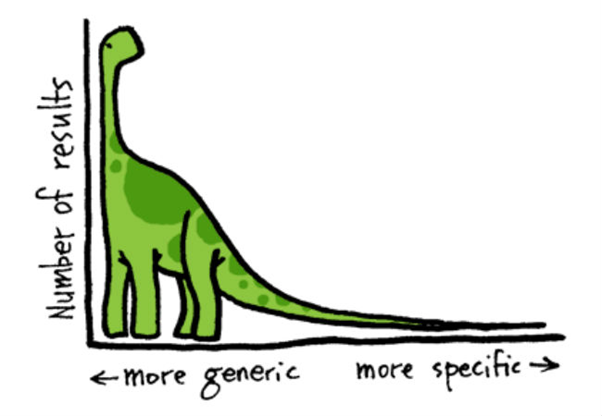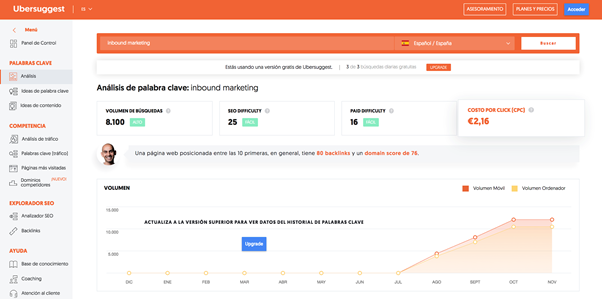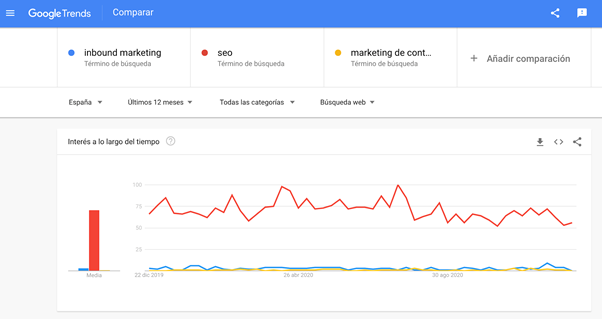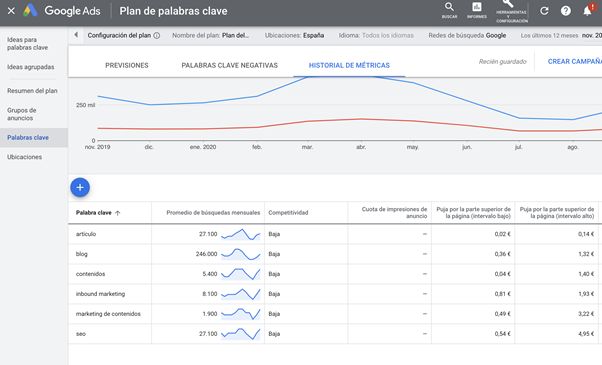
Cómo hacer una keyword research que te ayude a posicionarte en los buscadores
Marketing y Comunicación | Artículo-
Visitas3847
- Diciembre 2020
- Fecha de publicación
- Diciembre 2020
- Marketing y Comunicación
- Artículo

Profesor de ESIC Barcelona. CEO y cofundador de Cyberclick.
En 2012 fue nombrado uno de los 20 emprendedores más influyentes en España, menores de 40 años, según la Global Entrepreneurship Week 2012 e IESE.
En marketing hablamos muchas veces del marketing de contenidos, de los blogs corporativos y de otras herramientas similares. Aun así, todas ellas deben ir acompañadas de una buena estrategia de posicionamiento en buscadores para conseguir llegar a nuestro público objetivo. Crear contenido de valor no va a servir de mucho si no somos capaces de hacer que le llegue realmente a la gente.
Para que nuestra marca aparezca en los primeros resultados de Google, debemos elaborar un buen plan de SEO dentro de nuestra estrategia de inbound marketing. Este debe incluir los términos más relevantes por los cuales nos queremos posicionar como empresa y que nos ayudarán a que los algoritmos de los buscadores nos indexen mejor. Pero la pregunta es cómo podemos saber qué términos escoger para nuestra estrategia de SEO.
A continuación hablaremos de qué es una keyword research, cómo hacer una para tu empresa y algunas herramientas que pueden ayudarte.
Qué es una keyword research
Una keyword research es básicamente detectar qué palabras clave o términos de búsqueda nos pueden beneficiar como marca para posicionarnos en Google. El objetivo es aparecer en los primeros resultados de los motores de búsqueda cuando los usuarios busquen información sobre esas keywords en concreto. Así pues, las palabras clave son la base de cualquier estrategia de SEO.
Nuestras palabras clave deben tener unas características concretas para que nos puedan ser útiles:
• Que sean relevantes y que estén relacionadas con nuestra empresa.
• Que se ajusten a nuestros objetivos (de conversión, de notoriedad, etc.)
• Que tengan un buen número de búsquedas.
• Que no haya mucha competencia para esas keywords.
Las palabras clave que cumplan estas condiciones serán las idóneas para nuestra planificación de SEO.
Debemos distinguir, además, entre las keywords long tail y short tail. Los términos short tail son más generales y se componen de dos palabras como máximo. Al ser más genéricos y amplios, las keywords short tail tienen un gran número de búsquedas, pero también mucha competencia. En cambio, los términos long tail son más concretos y se forman con más palabras. Estos tienen menos volumen de búsquedas, pero suelen ser más relevantes y efectivos.

Cómo hacer una keyword research para tu empresa
Una vez explicadas cómo deben ser nuestras palabras clave, vamos a ver qué pasos hay que seguir para hacer una keyword research de éxito.
Busca ideas
Ahora que ya sabemos discernir entre los diferentes tipos de keywords, debemos empezar a elaborar nuestra propia lista de palabras clave incluyendo algunas short tail y otras long tail. Para crear esta lista, en primer lugar podemos hacer un brainstorming con todo el equipo. Sin limitaciones, entre todos podemos pensar en keywords que puedan encajar en nuestra estrategia de SEO. En segundo lugar, también podemos usar como fuente de inspiración a nuestros buyer personas: a través de sus necesidades, podemos prever cuáles pueden ser las palabras clave más adecuadas para su caso.
Analiza la competencia y las búsquedas
Después de este primer brainstorming, hay que empezar a escoger aquellas propuestas que puedan ser realmente efectivas para nuestra empresa. Para ello vamos a observar dos aspectos fundamentales: la cantidad de búsquedas de la keyword y su nivel de competencia.
Primeramente, hay que tener en cuenta el volumen de búsquedas que recibe cada palabra clave al mes. Lo ideal sería que, al menos, tuviese en torno a 50, ya que eso significa tráfico suficiente para que nuestro contenido creado sea rentable.
Por otro lado, también es muy importante conocer la competencia que tiene esa keyword. Hay varias plataformas que nos indican si los términos escogidos tienen mucha competencia, es decir, si hay muchas webs intentando posicionarse para esa misma palabra clave. Cuanta menos competencia, más fácil será llegar a posicionarse en los primeros resultados de Google para ese término.
La clave, pues, es encontrar keywords que tengan bastantes búsquedas mensuales y, al mismo tiempo, baja competencia. Si esto es difícil para tu sector, puedes empezar seleccionando términos long tail que, aunque no aparezcan en muchas búsquedas, tengan poca competencia.
Mejores herramientas para una keyword research
Para cualquier estudio de keywords podemos utilizar diferentes herramientas online. Algunas de ellas son gratuitas, pero para obtener datos más específicos, es muy probable que debamos recurrir a una versión de pago. A continuación detallaremos algunas webs que pueden ser de ayuda para una keyword research.
Ubersuggest
Una de las herramientas más conocidas en el mundo del SEO es Ubersuggest, del conocido marketer Neil Patel. Esta web es gratuita, aunque con limitaciones, y puede usarse sin registrarse. Ubersuggest sirve para buscar la calidad de las keywords y sugerir otras de similares long tail. La web muestra también los datos de tendencias y la cantidad de búsquedas de esa palabra clave.

Semrush
Otra herramienta de SEO muy famosa con la que podemos hacer nuestra keyword research es Semrush. Esta tiene muchas funciones más allá de la búsqueda de palabras clave y nos permite ver cuántas visitas tiene cada keyword y la competencia existente. Semrush también tiene una función muy útil para hacer keyword research enfocado al marketing de contenidos: un buscador de palabras clave sinónimas.

Google Trends
Google Trends es otra herramienta de Google que, aunque no está directamente relacionada con el SEO, puede ser útil para saber cuáles son las tendencias de búsqueda.
La realidad es que Google Trends no nos aporta datos como la competencia de una keyword ni la cantidad de búsquedas mensuales. Sin embargo, esta web nos permite ver qué términos están creciendo en Google y van a ser tendencia a largo plazo. Por ejemplo, podemos ver la popularidad de un término de búsqueda, compararlo con otros y ver la evolución de aquel a lo largo del tiempo. Finalmente, nos da la posibilidad de conocer las keywords más populares en un país y el interés que generan en cada subregión.

Herramienta de keywords de Google
Por último, la herramienta más clásica para hacer una keyword research es la herramienta de palabras clave de Google. Hace falta disponer de una cuenta de Google Ads e introducir en la plataforma los datos de pago, aunque no se requiere tener en marcha ninguna campaña (con la que gastar presupuesto) para poder usar la herramienta. Con esta web de Google obtendremos resultados bastante más precisos que con otras herramientas, ya que es la fuente original de las anteriores herramientas, aunque tiene sus limitaciones versus las opciones que te ofrecen las anteriores.

En resumen, existen varias webs que nos pueden ayudar a hacer nuestra keyword research. Aun así, es importante no olvidar cuáles son las premisas para encontrar una buena keyword: que tenga un buen volumen de búsquedas y que no haya demasiados competidores para ese mismo término. Las palabras clave, pues, son la base de las estrategias de SEO, del marketing de contenidos y de la metodología inbound marketing, y pueden mejorar considerablemente la posición de nuestra web en los buscadores.
Os recomendamos que no dejéis de actualizaros en las últimas tendencias y adquiráis los conocimientos adecuados. Os invito a que miréis detenidamente el Curso Especializado Online SEO & SEM y Analytics.
También te puede interesar

Qué es Angular, para qué sirve, ventajas y desventajas
En el desarrollo web actual, contar con herramientas que permitan crear aplicaciones web dinámicas, eficientes y bien estructuradas se ha vuelto esencial. En este contexto, algunos frameworks han cob...
- Publicado por ESIC Formación Profesional Superior

Customer effort score: qué es, cómo se mide y ejemplos
En un mercado donde la experiencia del cliente es clave, medir la satisfacción ya no es suficiente. Las marcas que lideran entienden que reducir el esfuerzo que un cliente debe hacer para resolver un...
- Publicado por _ESIC Business & Marketing School

¿Qué es Objective-C y para qué sirve?
Objective-C es un lenguaje de programación orientado a objetos, que sigue presente en el desarrollo de software para los entornos iOS y macOS. Aunque hoy comparte protagonismo con otras tecnologías,...
- Publicado por ESIC Formación Profesional Superior
